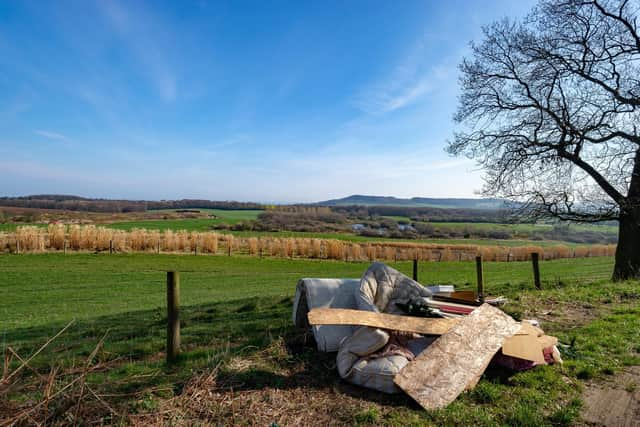Fly-tipping: Why Yorkshire farmers are paying the price as latest figures are revealed
While the numbers for Yorkshire were lower compared to other UK regions, such as London, where more than 422,000 were recorded, country organisations say fly-tipping is “blighting” rural communities with unrecorded incidents being on a “mass scale”.
There were 78,174 incidents for Yorkshire and the Humber with a further breakdown showing that 21,191 incidents were on highways, 23,373 on footpaths and bridleways, 326 on agricultural land, 128 on watercourses and 244 involved animal carcasses.
Advertisement
Hide AdAdvertisement
Hide AdThe Department for Environment, Food and Rural Affairs (Defra) has also provided data for areas within Yorkshire and the Humber which revealed that Bradford (15,402 incidents), Leeds (11,668) and Sheffield (11,387) were the places with the most reported incidents.


The lowest figures were at Craven with 96 incidents and Richmondshire with 226.
However, it is feared that the real figures are much higher and individuals rather than councils are footing the clear-up bill.
Country Land and Business Association President Victoria Vyvyan said: “These fly-tipping figures barely scratch the surface of a crime that’s blighting rural communities, with incidents on private land going unrecorded on a mass scale.
Advertisement
Hide AdAdvertisement
Hide Ad"Farmers and landowners bear the cost of removing rubbish and they pay on average £1,000 to remove waste. This is not a victimless crime - in some cases they have paid up to £100,000 to clear up other people’s mess or risk facing prosecution themselves.
“It’s not just litter blotting the landscape, but tonnes of household and commercial waste which can often be hazardous – even including asbestos and chemicals – endangering farmers, wildlife, livestock, crops and the environment."
Out of the 78,174 fly-tipping offences in Yorkshire – just 211 led to prosecution and £86,398 was spent on pursuing cases.
Action was taken on 47,124 cases and investigation actions on 32,215 cases.
Advertisement
Hide AdAdvertisement
Hide AdWarning actions were issued for just over 6,000 cases and fixed penalty notices issued for 1635 incidents and formal cautions for jut 55 incidents.
Ms Vyvyan called for more enforcement action to be taken.
She said: “While courts can sentence offenders to prison or unlimited fines, prosecutions are rare and criminals clearly do not fear the system. We are calling for local authorities to help clear fly-tipping incidents on private as well as public land, while the various enforcement agencies must be properly trained and resourced.
“Without more progress farmers, not the criminals, will continue to pay the price.”
Defra says the 1.08m fly-tipping incidents are a decrease of one per cent from the 1.09m reported in 2021/22 and that local authorities carried out 536,000 enforcement actions in 2022/23, an increase of 29,000 actions from 507,000 in 2021/22.
Sixty per cent of fly-tips involved household waste.
Comment Guidelines
National World encourages reader discussion on our stories. User feedback, insights and back-and-forth exchanges add a rich layer of context to reporting. Please review our Community Guidelines before commenting.
